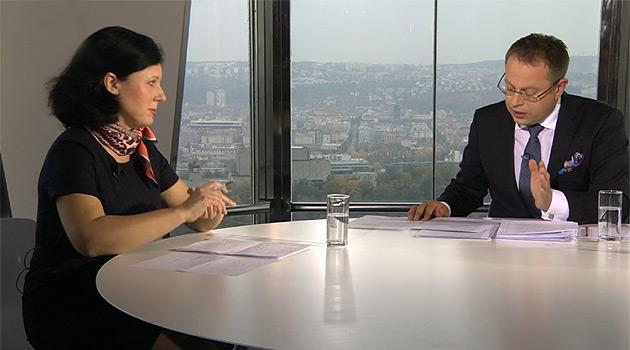EU Justice Commissioner: Whoever says refugees don't deserve aid has never spoken with one

The dissemination of hatred on the Internet, the refugee crisis and xenophobia in Czech society were the main topics of discussion between EU Justice Commissioner Věra Jourová and Czech MEP Stanislav Polčák on a recent episode of Czech Television’s "Václav Moravec’s Qustions" program. "We do not have, not the Union, which is to say the Commission or the Parliament, and not the Member States – we ourselves do not have a solution to this in hand. The European Union is not a federation that could entrust the resolution of asylum policy from on high to the Member States of the Union. We must address this together, and I would really appeal for us to listen to each other, for the West to listen to the East, which is saying: ‘We are concerned that we will have to… face the problem that the West has because it is a multicultural society’," the Commissioner said when asked to explain her view of the redistribution of refugees within the EU.
"Please note that it would also be good if the East were to listen to the West, which is saying: ‘Let’s help each other out now, right now there is a need that must be urgently addressed. Let’s show solidarity with one another, let’s be humane,’ which brings me back to the beginning. ‘Let’s be humane’ means, among other things, let’s do what is, in my opinion, simply above reproach, and that is to uphold the international legal obligations of the Geneva Conventions, which clearly state that people who are fleeing war deserve aid," she said.
Has the Czech President ever seen a refugee?
Moderator Václav Moravec, in the context of the discussion of refugee reception and solidarity, asked the Commissioner her opinion of Czech President Miloš Zeman’s recent remarks that "Most refugees do not deserve compassion and use their own children just a human shields." The Commissioner responded that "… I believe anyone who says most refugees are criminals or people who don’t deserve aid have never seen or spoken with them."
"I have driven through several refugee camps where I have spoken with children who made it to Europe under unbelievable circumstances after their Dads told them: Run. They were boys from Syria. They are in Anderlecht or Brussels today, and I saw the immeasurable effort they were making to integrate. They attend school, they are learning – for God’s sake, no one would ever say that these children or even the adults a priori do not deserve our aid. We ourselves have also demanded aid in the past, more than once," the Commissioner said.
Czech MEP Stanislav Polčák added the following: "What puzzles me about these remarks is the collective judgment, the collective vision. The Czech President, a public authority, is basically tarring everyone with the same brush and saying: ‘Look at them, it’s going to be like thus and so.’ I believe collective blame is one of the most tragic periods to have ever hit Europe."
Image of the enemy
In the context of President Zeman’s remarks, the Commissioner reminded viewers of the philosophers and sociologists who have studied the dissemination of evil and hatred in society: "…more or less all of them have arrived at the conclusion that always, in the beginning, what is created is an image of the enemy, a dehumanized mass of people – not even human beings, just a mass at whom the hatred is concentrated because someone has long labeled them a danger… . If this is disseminated by people who have a big influence over public opinion, then it is very, very serious. I believe this society should mobilize all of its common sense and critical thinking, because that is precisely what that image of the enemy does with people, with normal people, it deprives them of their capacity to evaluate things critically."
Together with Justice Ministers of the EU-28 and with the big firms that dominate the world of the Internet and social networking sites, the Commissioner is attempting to develop a barrier against the dissemination of hatred online. According to her, these meetings have been about "once again reiterating the legal rules for the Internet world and being assured by the main players, like Facebook, Google, Twitter, etc., that they also understand that they are not above the law."
She believes the big firms understand these requirements and are aware of the risks of radicalization by certain social groups. Jourová also claimed 80 % of the European citizens who have joined the so-called Islamic State fighters have been radicalized through social networking sites.